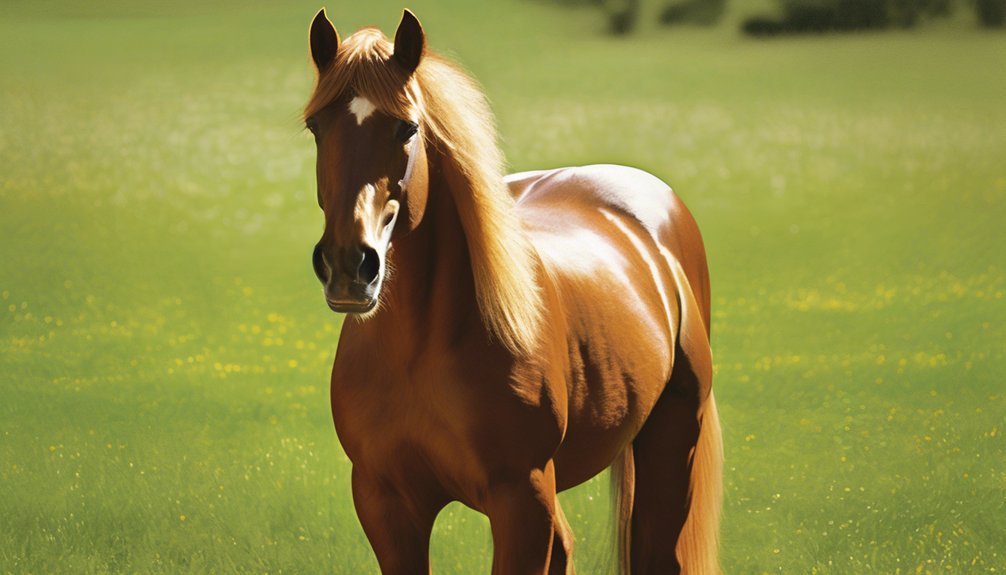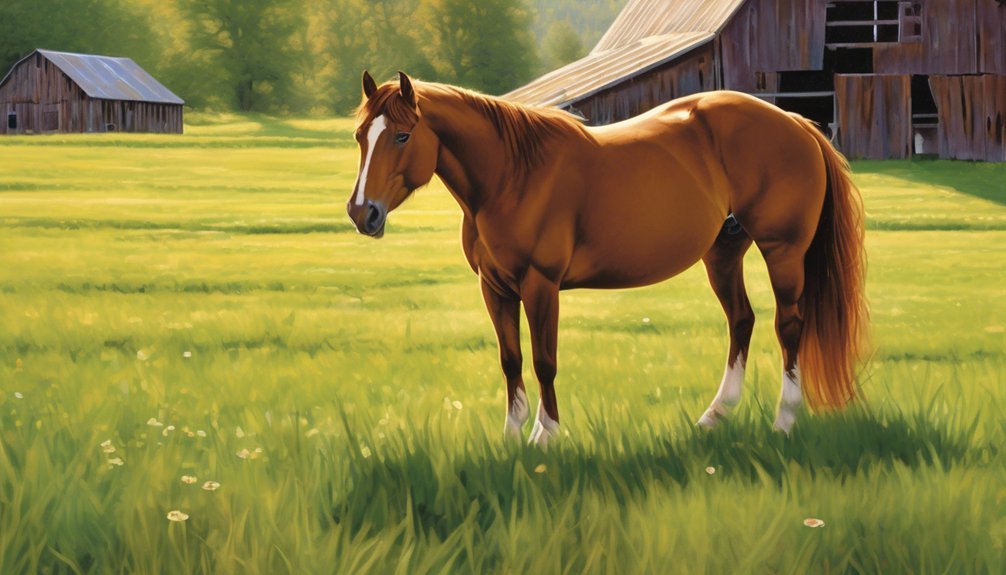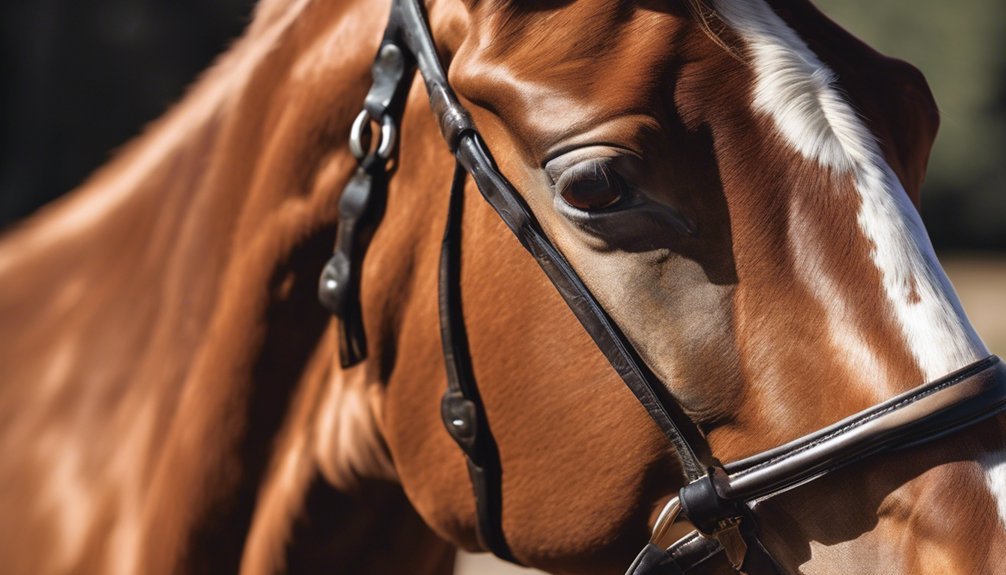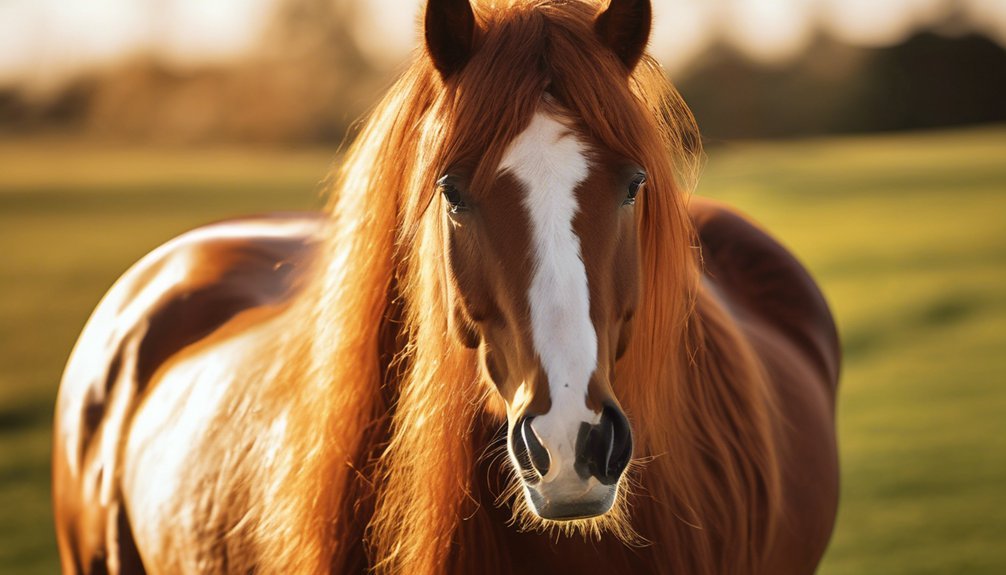
Your horse's coat can often reveal hidden truths about its overall health. Nutrition plays a pivotal role in determining the quality and appearance of that coat. By understanding the key nutrients involved, you can make informed decisions that enhance not just the luster of your horse's fur but its overall well-being. What specific dietary components should you focus on to ensure a radiant coat?
Key Takeaways
- A balanced diet rich in omega-3 and omega-6 fatty acids ensures moisture and shine in a horse's coat.
- High-quality protein sources enhance hair growth, skin health, and coat color vibrancy while reducing brittleness.
- Vitamins A and E support skin repair and provide antioxidant protection for a healthier coat.
- Adequate hydration, through fresh water and high-moisture feeds, is essential for maintaining skin elasticity and coat appearance.
- Signs of dullness and excessive shedding may indicate nutritional deficiencies, necessitating dietary adjustments for optimal coat health.
Understanding the Connection Between Nutrition and Coat Health

When you consider your horse's coat health, it's essential to recognize how nutrition plays a pivotal role. Implementing effective nutrition strategies can significantly improve coat maintenance.
A balanced diet rich in essential vitamins and minerals supports the natural oils in your horse's skin, which contribute to a shiny, healthy coat. Focus on providing high-quality forage, grains, and supplements tailored to your horse's specific needs.
Omega-3 and omega-6 fatty acids are particularly beneficial, promoting hydration and elasticity in the coat. Additionally, ensure your horse stays hydrated, as water intake directly influences skin health.
Key Nutrients for a Shiny Coat
To achieve a shiny coat, you need to focus on specific nutrients that play crucial roles in skin and fur health. Omega-3 and Omega-6 fatty acids are vital for maintaining moisture and promoting a glossy appearance. Incorporating beneficial supplements like flaxseed or fish oil can enhance these fatty acids in your horse's diet.
Additionally, vitamins A and E are essential for skin repair and antioxidant protection, helping to prevent dullness. You might also consider dietary adjustments that include biotin and zinc, which support keratin production and overall coat strength.
The Role of Protein in Coat Quality

Protein plays a crucial role in maintaining coat quality, with research suggesting that up to 30% of a horse's diet should consist of high-quality protein sources.
Amino acids, the building blocks of proteins, are vital for promoting a healthy, shiny coat. By ensuring your horse receives adequate protein, you can enhance their coat in several ways:
- Promotes hair growth and strength
- Supports skin health and moisture retention
- Enhances coat color vibrancy
- Reduces brittleness and breakage
- Aids in overall vitality and well-being
Incorporating sources like alfalfa, soybeans, and high-quality grains can help achieve these benefits.
Essential Fatty Acids: The Secret to Luster
A well-balanced diet not only provides protein but also incorporates essential fatty acids, which are vital for achieving a lustrous coat.
These fatty acids, particularly omega-3 and omega-6, improve skin health and enhance coat shine. By including quality fatty acid sources like flaxseed, fish oil, or chia seeds in your horse's diet, you can support overall coat quality.
Omega supplementation helps regulate inflammation and promotes healthy skin, allowing your horse's natural beauty to shine through.
When you prioritize these essential nutrients, you're not just enhancing their coat; you're contributing to their overall well-being.
Vitamins and Minerals That Promote Healthy Fur

While you might focus on fatty acids for coat shine, vitamins and minerals play a crucial role in promoting healthy fur as well. A balanced intake of these nutrients ensures your horse's coat remains vibrant and lustrous.
Here are some key vitamins and minerals to consider:
- Vitamin E: Supports skin health and fur texture.
- Biotin: Enhances keratin production for stronger hair.
- Zinc: Aids in maintaining a healthy mineral balance, preventing hair loss.
- Copper: Contributes to pigment and coat color.
- Omega-3 fatty acids: Works alongside vitamins for added shine.
Incorporating these vitamin sources into your horse's diet can profoundly impact their coat quality, ensuring they look their best.
The Importance of Hydration for Coat Appearance
Hydration significantly influences your horse's coat appearance, as water is essential for maintaining skin elasticity and overall health.
To ensure a vibrant coat, you need to provide adequate hydration sources, such as fresh water, high-moisture treats, and even wet feeds. The quality of the water matters, too; clean, uncontaminated water promotes better absorption and overall hydration levels.
If your horse is dehydrated, you may notice a dull coat, dry skin, or even increased shedding. By prioritizing hydration, you support not only coat shine but also skin health, which ultimately enhances your horse's overall appearance.
Regularly check water quality and adjust your horse's hydration sources to keep their coat looking its best. Your horse will thank you for it!
Common Nutritional Deficiencies and Their Effects on Coat

Maintaining hydration is just one piece of the puzzle when it comes to your horse's coat quality. Nutritional deficiencies can lead to a lackluster coat and other health issues.
Here are some common deficiencies to watch for:
- Zinc deficiency: Can cause rough, flaky skin.
- Omega 3 deficiency: Leads to a dry, brittle coat.
- Biotin importance: Essential for hoof and coat health; a lack can result in dullness.
- Vitamin E: Crucial for skin health; deficiency can cause poor coat condition.
- Copper deficiency: Impacts pigmentation and overall coat shine.
Additionally, ensure your horse gets enough quality protein sources and selenium plays a vital role in their overall health.
Addressing these deficiencies can significantly enhance coat quality.
Feeding Strategies for Optimal Coat Condition
To achieve an optimal coat condition, it's essential to implement targeted feeding strategies that address your horse's specific nutritional needs.
Start by ensuring a balanced diet rich in essential fatty acids, which promote shine and health. Incorporating natural supplements like flaxseed or omega-3 can significantly enhance coat quality.
Pay attention to protein sources as well; quality proteins are vital for hair growth.
Additionally, don't underestimate the role of grooming routines. Regular brushing helps distribute natural oils, improving coat luster and removing dirt.
Combine these nutritional practices with consistent grooming to create the best environment for your horse's coat to thrive.
The Impact of Quality Feed on Coat Health

While you may focus on grooming and supplements, the quality of feed plays a crucial role in your horse's coat health. Choosing the right feed types ensures your horse gets essential nutrients that promote a shiny, healthy coat.
Here's what quality feed can do:
- Provides adequate protein for hair growth
- Supplies healthy fats for a glossy finish
- Contains vitamins and minerals to combat dullness
- Supports overall skin health, reducing irritation
- Enhances the effectiveness of coat supplements
Investing in high-quality feed not only nourishes your horse from the inside out but also makes grooming more rewarding.
Monitoring Coat Quality: Signs of Nutritional Imbalance
A horse's coat can reveal much about its nutritional status, serving as a visible indicator of any imbalances in diet. You should closely monitor coating conditions to detect potential issues.
Dullness, excessive shedding, or patchy areas often signal deficiencies in essential nutrients like protein, fatty acids, or vitamins. Pay attention to dietary observations—if your horse's coat appears less vibrant or healthy, it might be time to reassess their feed.
Uneven growth or a brittle texture can indicate that your horse isn't receiving adequate minerals. Regularly checking your horse's coat not only reflects overall health but also guides your feeding strategy, ensuring they receive a balanced diet that supports a lush, radiant coat.
Frequently Asked Questions
Can Supplements Improve a Horse's Coat Quality?
Yes, certain supplement types, like omega fatty acids and biotin, can enhance your horse's coat shine. By carefully selecting these supplements, you can significantly improve your horse's overall coat quality and appearance.
How Long Does It Take for Diet Changes to Affect Coat Appearance?
You might think a diet transition works like magic, but it usually takes four to six weeks for noticeable coat recovery. Patience is key as your horse's coat gradually reflects their improved nutrition.
Are Certain Breeds More Affected by Nutrition Than Others?
Some breeds exhibit greater breed sensitivity to nutrition, meaning their nutritional requirements can significantly influence coat quality. By understanding these differences, you can tailor your horse's diet for optimal health and appearance.
What Role Does Environment Play in Coat Health?
Just as a flower thrives in the right garden, your horse's coat health hinges on its environment. Climate effects and stable conditions directly influence coat texture and shine, emphasizing the importance of a nurturing habitat.
How Do Stress and Nutrition Interact to Impact Coat Quality?
When you manage stress effectively, it enhances nutrient absorption, ensuring your horse's coat remains vibrant. Poor stress management can hinder this process, leading to a dull coat. Prioritize both aspects for optimal coat health.
Conclusion
In conclusion, just like a well-tuned orchestra creates beautiful music, a balanced diet harmonizes your horse's coat quality. By ensuring your horse gets the right mix of protein, fatty acids, vitamins, and minerals, you'll not only enhance their coat's shine but also boost their overall health. Regularly monitoring their nutritional intake is essential, as it allows you to make necessary adjustments, ensuring your horse always looks and feels its best.





